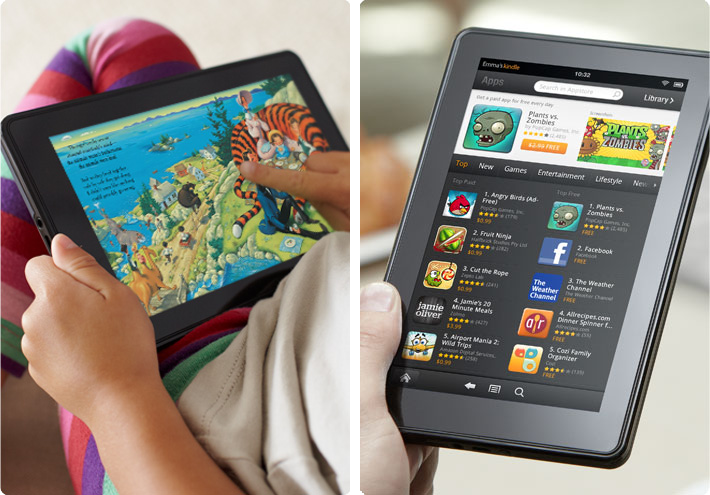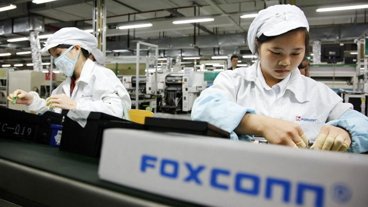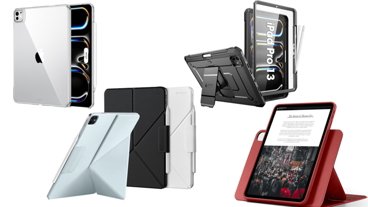Apple says Amazon Kindle Fire will further fragment Android
Ben Reitzes of Barclays Capital recently met with Cook and Oppenheimer at Apple's Cupertino, Calif. campus. Though they expectedly did not reveal anything about the company's product pipeline, they did express optimism about Apple's current market position.
In particular, they indicated they are not concerned about the Amazon Kindle Fire, a new touchscreen tablet from the online retailer that will be powered by the Android mobile operating system. The Kindle Fire will sell for $199, or less than half the $499 entry price of Apple's iPad lineup, when it launches on Nov. 15.
"While the pricing at $199 looks disruptive for what seems to be the iPad's most important rising challenge, the Amazon Fire — it is important to note that it could fuel further fragmentation in the tablet market — given it represents yet another platform," Reitzes wrote. "While compatible with Android, the Apps work with Amazon products.
"The more fragmentation, the better, says Apple, since that could drive more consumers to the stable Apple platform."
Apple's response to the Kindle Fire could be viewed as evidence that the company is not planning any major moves to respond to Amazon's touchscreen tablet. In October, one rumor claimed that Apple was going to counter the Kindle Fire in 2012 with a so-called "iPad mini."
Reitzes believes that Apple will eventually get more aggressive in its iPad pricing and dip below the current $499 entry-level price of the 16GB Wi-Fi-only model. But Apple won't cut the price if it ends up sacrificing the product quality and user experience.
He believes the appeal of the iPad could be extended to more PC users if Apple were to extend keyboard options with touchpads, in addition to the touchscreen interface on the iPad itself.
As for the iPhone, Reitzes believes that Apple "clearly" has room to expand its smartphone sales with new markets and pricing strategies. He said that Cook expressed excitement both about the potential for the iPhone in Asia, as well as user response to the Siri voice recognition software on the newly released iPhone 4S.
Barclays Capital has forecast Apple to sell 30.7 million iPhones in the company's December quarter, a number that Reitzes said is "conservative," considering the rapid international rollout of the new handset. Apple announced this week that Hong Kong, South Korea and 13 more countries will gain access to the iPhone 4S on Nov. 11.
 Neil Hughes
Neil Hughes














 Amber Neely
Amber Neely
 Thomas Sibilly
Thomas Sibilly
 AppleInsider Staff
AppleInsider Staff
 William Gallagher
William Gallagher
 Malcolm Owen
Malcolm Owen
 Christine McKee
Christine McKee










129 Comments
The tablet's a joke. It is no threat to Apple or to the iPad at all.
It's tiny. It's slightly larger than the large size Android phones. So are Fandroids going to be walking around with a 5" phone and a 7" tablet? Why not just get a 6" phone/tablet?
I don't think that something that is smaller than some people's penis size even qualifies to be designated a tablet. 7" is closer to a large phone than to a tablet.
It's locked into Amazon's ecosystem, and the people who buy the tablet because of it's $199 price tag aren't the kind of people that are going to be buying a lot of content.
It's not even real multitouch. It's basically a cheap tablet for people who can't afford anything else. And at it's core, there is the horrible Android running things.
Enough already with the keyboards, why should Apple take a leap in the past, to please who exactly? The analysts?
Keyboards are a dying breed, just like the users they supposedly would please...
"While the pricing at $199 looks disruptive for what seems to be the iPad's most important rising challenge, the Amazon Fire -- it is important to note that it could fuel further fragmentation in the tablet market -- given it represents yet another platform," Reitzes wrote. "While compatible with Android, the Apps work with Amazon products.
"The more fragmentation, the better, says Apple, since that could drive more consumers to the stable Apple platform."
I'm not sure that the Fire is really in the same category as the iPad or the full-featured ICS tablets (assuming they eventually hit the market).
I think maybe the customers will see it as a limited-use device, and might be content with Amazon's software offerings. Most smartphone buyers don't seem to care about getting lots of various apps, or even OS updates - and it seems likely that buyers of low-priced mini-tablets might be similar.
I'm not even sure that most Fire customers will know that it runs Android under the hood. That would be kind of like customers wondering if the cylinder heads in their subcompact use a hemispherical combustion chamber - very few will care.
Enough already with the keyboards, why should Apple take a leap in the past, to please who exactly? The analysts?
Keyboards are a dying breed, just like the users they supposedly would please...
Reitzes is obviously a pc user. He definitely sounds like someone who went to the Ballmer Business School.
"... it doesn't appeal to business customers because it doesn't even have a keyboard... I like our strategy... we are selling millions and millions and millions of phones every year, Apple is selling zero... "
1) I disagree with Apple's assesment. Because it's a fork it's insulated enough from the standard Android builds that it will have a null effect on Android. What it will do is hurt Android sales as if it were a $199 tablet built on WebOS, WP7, or some other OS entirely.
2) I still say this tablet-esque $199 entry-level device will help iPad sales. IOW, those that want a full-blown tablet or not afaid to spend $500+ on a tablet will be iPad customers, but those unsure of how a tablet will convenience their life might find the Kindle Fire as a feasible purchase for two bills. If they like the overall experience and want a more well-rounded tablet experience they might become iPad customers for their next purchase.